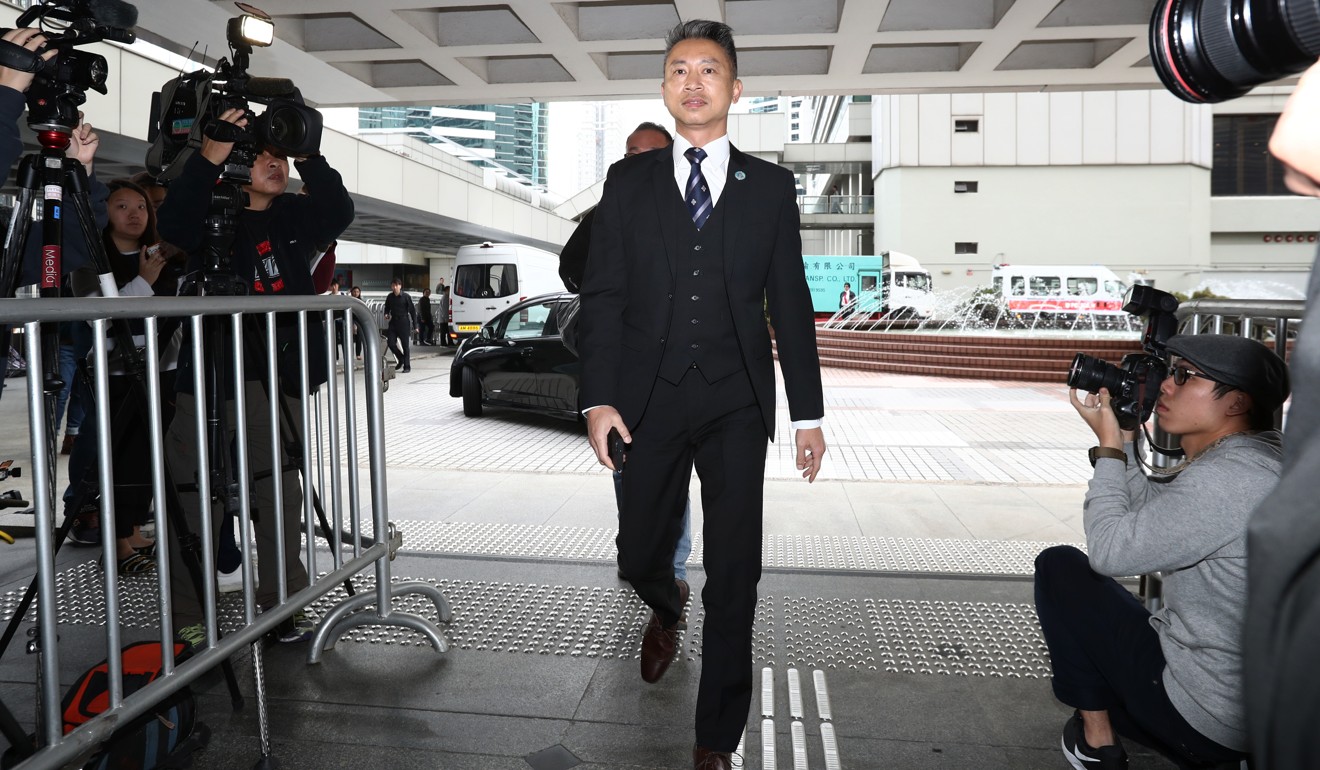
In a first, convicted Occupy policeman gets green light to appeal by Hong Kong court
Judge gives chief inspector permission to appeal against his two-year jail term and agrees legal issue at stake
For the first time since seven Hong Kong police officers were convicted of assaulting a high-profile pro-democracy activist during the 2014 Occupy protest, a local court ruled on Friday that an appeal in one of the cases could proceed.
Chief Inspector Wong Cho-shing was seeking to overturn his conviction and two-year jail term handed down in February for beating Ken Tsang Kin-chiu, an event caught on television news footage.
The Court of Appeal on Friday gave Wong permission to appeal against his sentence and agreed that one of the grounds for his challenge was a legal issue, meaning he could proceed without further permission.

But the court’s vice-president, Mr Justice Michael Lunn, refused to accept Wong’s claim that he had not been identified in the crime or that footage capturing the assault might have been edited.
The legal issue centred on the footage. Defence counsel Tim Owen QC, for Wong, argued that the trial judge had adopted an incorrect legal standard in allowing video clips to be admitted as evidence for the prosecution. Owen said the footage had yet to be proved authentic.
Judge in Occupy activist’s assault trial should have pressed media to hand over video footage, court hears
A considerable part of the trial hinged on various news clips the prosecutors produced, which ran from the point when the seven officers took Tsang over from their colleagues to when they began to beat him in a dark corner near a major protest site in Admiralty on October 15, 2014.
I am satisfied that the test to be applied by the judge in determining whether or not the video footage was prima facie authentic is a matter of law
In the run-up to the officers’ trial, prosecutors were unable to obtain the footage in question directly from news outlets as press freedom concerns had been raised. The prosecutors instead downloaded vital clips from the internet, which became a point of contention for the defence.
Lunn sided with Owen on the question about the footage, maintaining that Wong did not need permission to appeal on this ground.
“I am satisfied that the test to be applied by the judge in determining whether or not the video footage was prima facie authentic is a matter of law,” he wrote in his judgment.
But he disagreed with Owen’s other suggestions, including the assertion that the trial judge, David Dufton, should have forced media to hand over news footage regardless of concerns of press freedom. He said it was not “reasonably arguable” that Wong had never been identified for the crime or that footage capturing the assault had been edited.
Lunn refused to let Owen argue these points further when the appeal is heard. The actual date for hearing the appeal has yet to be decided.
Wong’s grounds for his appeal against his sentence were revealed for the first time in court on Friday.
His lawyers further criticised Dufton’s sentencing, contending the judge did not take into account that Wong was a police officer with 30 years of distinguished service and that he was among colleagues “under constant, unparalleled pressure in which they faced provocation and violence”.
TV engineer sues Hong Kong government over alleged police assault during Occupy protests
In his ruling, Lunn quoted what his colleague Mr Justice Wally Yeung Chun-kuen said when he granted bail to the other convicted officers. Yeung said it was “highly arguable” that the sentence was “manifestly excessive”.
Wong, clad in a black suit, reacted calmly in the public gallery on Friday, and had a short discussion with his lawyers before leaving. He was granted bail.
A group of police supporters chanted slogans outside the court. As Wong boarded a vehicle that came to pick him up, a woman yelled into a megaphone: “Do not retreat even facing war!”
Last Hong Kong policeman in jail for Ken Tsang assault released on bail
Wong and six others were convicted on February 14 this year of one count of assault occasioning actual bodily harm on Tsang. One of the seven was convicted of an additional count of common assault for beating Tsang at a police station. Each man was jailed for two years.
The District Court found the seven had punched and kicked Tsang, who was ziptied on the ground, after they brought him to a substation near the city’s legislature in Admiralty.
The six others are also on bail awaiting permission for their respective appeals. They are Senior Inspector Lau Cheuk-ngai, Detective Sergeant Pak Wing-bun, Constable Lau Hing-pui, and Detective Constables Chan Siu-tan, Kwan Ka-ho and Wong Wai-ho.

